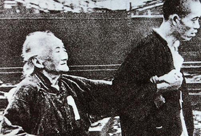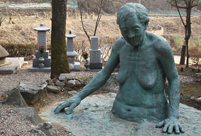Media have reported that cities including Tianjin, Guangzhou, Shenzhen and Xiamen are now striving to become the next Shanghai.
In a discussion with NPC deputies from Guangdong on Thursday, the president also urged the province to continue to take the lead in reform, speed up building a modern market economy and transforming government functions, as well as adopt more active opening-up policies.
"In future reform, authorities not only have to seek progress in the marketization of production factors, but should also push for breakthroughs in the reform of monopolized industries," said Chi Fulin, head of the China Institute for Reform and Development, a Hainan-based think tank.
"Marketization reform in the next two or three years will set the tone for China's economic growth in the following five to 10 years," he added.
From the speeches, it can also be seen that economic development remains a core task for the government, and the decisive role of the market has been highlighted once again.
"Economic growth is key to every issue at hand," Premier Li told Shandong lawmakers on Thursday morning. "Without growth, we will see no increase in employment nor in people's incomes."
He said the government should leave what can be handled by the market to the market and create a fair environment for enterprises to release market vitality and social creativity.
Li's call echoed a reform masterplan released after a key plenum of the Communist Party of China Central Committee in November, which recognized the private sector's role in fostering growth and creating jobs.
The November document said China will actively develop a mixed ownership economy, allowing more state-owned enterprises and other firms to develop into mixed-ownership companies.
Progress has already been made. China's top oil refiner, Sinopec, announced in mid-February that it would bring in social and private capital to jointly market and sell its oil products, the first act of opening up the largely monopolized sector.
Despite pursuing a proper growth target -- around 7.5 percent this year, Chinese leaders have pledged a cleaner growth mode against the backdrop of mounting complaints about air, water, soil pollution after three decades of rapid development.
Joining a discussion with lawmakers from the southwestern province of Guizhou on Friday, President Xi called for coordinated development of the economy, society and the environment.
"Authorities must work to balance environmental protection and economic growth... so as to achieve social and economic benefits while maintaining a clean environment," he said.
Similar ideas were also expressed in Li's speeches during his meetings with lawmakers from Qinghai, Yunnan and Shanxi -- relatively underdeveloped regions in the country's western and northern parts.
The comments came after the premier's work report "declared war" on pollution and promised to "fight it with the same determination we battled poverty."
Chinese leaders have repeatedly pledged to curb pollution, but a spell of smog that enveloped some 15 percent of the country's territory a week ahead of the NPC session added urgency to the matter.
"Smog is affecting larger parts of China and environmental pollution has become a major problem, which is nature's red-light warning against the model of inefficient and blind development," according to Li.
China will cut outdated steel production capacity by 27 million tonnes this year, slash cement production by 42 million tonnes and also shut down 50,000 small coal-fired furnaces across the country, he said in the report.
"The former path of high consumption and pollution and low profits has come to an end," said Yu Yong, head of the Hebei Provincial Metallurgical Industry Association.
 |
 Chaihe village, pure and peaceful fairyland in snow
Chaihe village, pure and peaceful fairyland in snow Belgians warmly welcome arrival of China's giant pandas
Belgians warmly welcome arrival of China's giant pandas Female marines receive tactical training in NW China
Female marines receive tactical training in NW China Blood memory: Nanjing Massacre in 1937
Blood memory: Nanjing Massacre in 1937 Top 10 pure beauties in showbiz
Top 10 pure beauties in showbiz British WWII veteran: I can't forgive Japan
British WWII veteran: I can't forgive Japan Tongban's dream of prosperity
Tongban's dream of prosperity Chinese frigate Yancheng holds drills in Mediterranean Sea
Chinese frigate Yancheng holds drills in Mediterranean Sea A visit to comfort woman's home in South Korea
A visit to comfort woman's home in South Korea Fairyland? Qingdao in sea of clouds
Fairyland? Qingdao in sea of clouds Top 10 most handsome faces in Asia in 2013
Top 10 most handsome faces in Asia in 2013 Female celebs with beautiful long legs
Female celebs with beautiful long legs Cat 'guardians' in Forbidden City
Cat 'guardians' in Forbidden City Large numbers of ancient coins excavated in Inner Mongolia
Large numbers of ancient coins excavated in Inner Mongolia Leisurely life beneath Zhonggulou, where time travels slower
Leisurely life beneath Zhonggulou, where time travels slowerDay|Week|Month